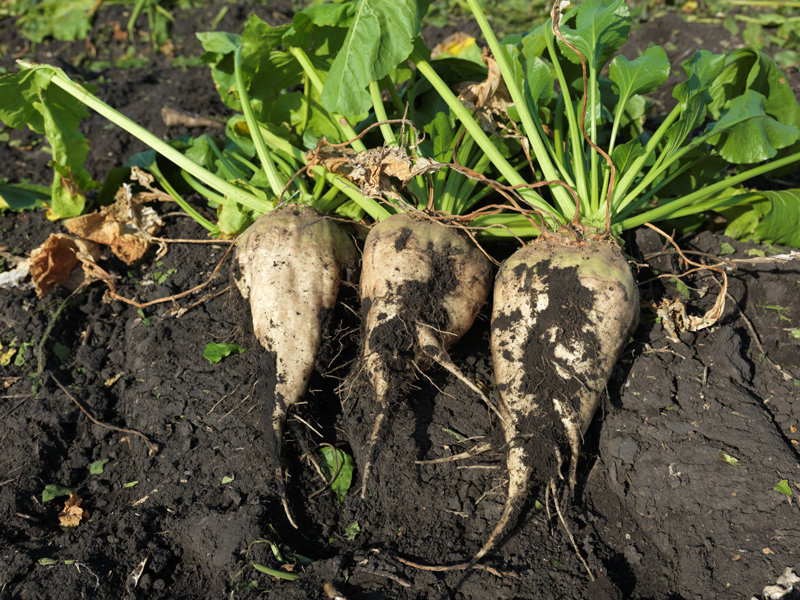
Planting for the Future
What We Grow
At Sproule Farms, we select our crops with precision. We know our land and know what it will produce. We have been growing a variety of crops for over 30 years and continue to sharpen our practices.
We primarily farm in the North Dakota Red River Valley and in Bath, IL.
We never limit ourselves to conventional crops. We are constantly aware of new, innovative opportunities and pursue them when the potential for success exists.
Sugarbeets
The harvest of sugarbeets is a very well-known fall event in our communities. Due to the unpredictability of Mother Nature and the limited times it is effective to lift the beets, harvest can be a time of anxiety for the local farmers.
Sproule Farms prides itself on safely delivering its sugarbeet crop to the pilers and factories. When sugarbeet harvest begins, you will often find us working 24 hours a day until harvest is complete.
American Crystal is the local sugarbeet cooperative in the northern Red River Valley. Owned by the approximately 3,000 farmers who raise nearly 500,000 acres of sugarbeets in the Red River Valley, the organization is directed by a Board made up of local farmers.
In order to plant sugarbeets in this area, each farmer must purchase or rent beet stock. Each share of beet stock represents the rights to raise one acre of sugarbeets. Not only do we farm our own sugarbeet acres, but we also rent sugarbeet stock from others and are always looking for partnerships to grow more sugarbeets. The return on investment has historically been very good, resulting in sugarbeets being considered one of the premier crops in our area. A lot has been invested in the agronomy of sugarbeets locally. Specifically, genetic research has led to dramatic increased productivity over the last decade and has improved profitability of sugarbeets.
Soybeans
Soybeans have grown in popularity for a variety of reasons. As our culture becomes more health-conscious, the protein in soybeans has been proven to be an adequate substitute for animal protein. Soybean oil has many uses such as food, blending with other vegetable oils, being used as a biodiesel feedstock and as a feed (energy) source for animal feed. There have been recent innovations in using Soybean by-products to produce candles, soaps, paint and other alternatives to petroleum products. We not only grow soybeans for the above purposes, but we also contract to grow soybean seed for some of the leading US soybean companies.
Researchers at NDSU have been instrumental in improving the productivity & sustainability of soybeans in recent years. Soybean seed companies have also played an important role in developing varieties of soybeans that work well in our cooler climates, while improving some of the key valuable characteristics of soybeans such as protein and oil content.
Check out www.ndsoybean.org for more information about the many uses for soybeans.
Edible Beans
The United States produces the 6th most dry edible beans in the world and North Dakota produces more than any other state. In fact, on average North Dakota produces 32% of our countries edible beans. The vast majority of North Dakota edible beans are grown in the Red River Valley. Black, Pinto, Navy and Red Kidney are a few of the most notable.
Since WWII, Beans have become a staple in American’s diets. Beans are a great source of protein boasting low fat, no saturated or transfats and are naturally cholesterol free. Research shows a diet including beans can even reduce your risk of heart disease!
Depending on the year and the markets demand, Sproule Farms generally grows Navy, Black, or Pinto beans.
Corn
Corn is believed to be the first agricultural crop grown in North Dakota, grown nearly 300 years ago by the native people. Though this may be the case, only as recent as the last couple of decade has corn become a viable cash crop for farms located in North Dakota. Improved genetics have allowed this important food and biofuel crop to be grown further north, where shorter summers pose a significant issue for a crop with such a long growing season.
There are several uses for corn grown in North Dakota – processing for corn oil, corn syrup, livestock feed and ethanol.
Hard Red Spring Wheat, Durum, & Other Specialty Wheat
North Dakota is the top producing state in the USA for hard red spring wheat, producing an average of 250 million bushels each year. This wheat stands out for its high protein & gluten content which makes it an ideal flour for baking as it improves mixing characteristics, water absorption and dough handling. Hard Red Spring Wheat is used mostly for specialty breads, bagels, and everyones favorite food…. Pizza! We grow wheat on our farm every year, varying the acres depending on world markets and consumer needs.
Alongside Hard Red Spring Wheat, North Dakota is also the top producing state in the nation for Durum with over 820,000 acres of durum harvested in 2021. Durum, which is leading ingredient in pasta, is the hardest and largest of all wheats with nice vitreous (clear) amber color.
Aside from traditional hard red spring wheat & durum, we also grow specialty wheat varieties for food products customers.
Rye
Rye is a crop that is most often used in sustainability practices such as a cover crop & to provide crop diversification. However, rye is actually very good for your health. Rye is a good source of soluble fiber, vitamin E, calcium, iron, and potassium, and has been linked to a reduced risk of cardiovascular disease, colon cancer, breast cancer and diabetes. Because rye is harder to refine than wheat, it retains more of its nutrients.
We plant our rye in the fall of the year. It sprouts just before winter at which time it will go dormant through the winter months. Upon springtime, the rye comes out of dormancy and continues to mature, allowing us to harvest it mid-summer.
We have a full dimensional rye program implemented on our farm, growing registered seed and certified seed and rye for grain. We supply mills that produce flour & distilleries to produce alcohol.
Oats
Oats are among the healthiest grains on earth. They're a gluten-free whole grain and a great source of important vitamins, minerals, fiber, and antioxidants.
When harvesting our oats, we go through a stringent purity protocol to ensure no cross contamination from our other grains to ensure their gluten free nature.
The oat variety we grow is a naturally high protein, hull less oat, which means it is grown without the outer shell. By not having this excess mass, these oats are grown with 46% less carbon emissions than traditional oats.
Hemp for Grain
Hemp is thought to be one of the first agricultural crops raised. Evidence of hemp was found in modern day China and Taiwan that dates back to 8000 BC. In America, the people of Jamestown, the first English colony, grew hemp to make clothes, rope, and other materials from the fiber in the early 17th century. After several decades of it being illegal to grow, the 2018 Farm Bill removed hemp from the DEAs list of controlled substances and put it under the control of the US Department of Agriculture. This is great news for the American farmer because it creates a new market with vast potential.
Hemp is one of the most versatile crops raised in America. It can be harvested for its cannabidiol (CBD) oil, its seed, and/or its stalk. Hemp seed is one of the most nutritious seeds on the market. It contains all ten amino acids, omega-3 fatty acids, protein, and other vital nutrients that are beneficial to your health. Hemp fiber, derived from the stalk of the plant, has multiple uses like rope, clothing, and even cars! Click here to see a video of Henry Ford’s “Hemp Car” in 1941.
Sproule Farms began growing hemp in 2019. We are raising it for seed and grain. We are excited to be on the front end of a growing market and we are always looking for new partners in this nascent industry. Contact us for more information!
Potatoes
In North Dakota, we produce red potatoes and our Neumiller-Sproule Farms partnership in Illinois produces white potatoes. The Neumiller family and Neumiller Farms has been an enjoyable and productive partners! Starting on a handshake in 1997, we continue to expand our horizons into new crops. Though we generally grow potatoes, but have planted a variety of other crops as well such as carrots, canning pumpkins and sweet corn. This valuable and fertile irrigated land is ideal for growing these crops and in turn has been largely successful.
The potatoes grown on this land are processing potatoes used for making potato chips and salads. Much of our crop is sent field to factory to a near by chip plant. Depending on the time of year, much of our crop goes from the field to a bag of potato chips in as little as 4-24 hours! Want to learn more about our Bath, IL farm? Watch our videos about Neumiller-Sproule Farms and Potato Planting.
Carrots
We grow carrots from time to time at our Bath, IL farm if the market demands it. The carrots we have grown are used for canning in various canned foods. This is always a fun process for us with carrots not being one of our main crops. Ever wondered how carrots are harvested? Check out our carrot harvest video.










